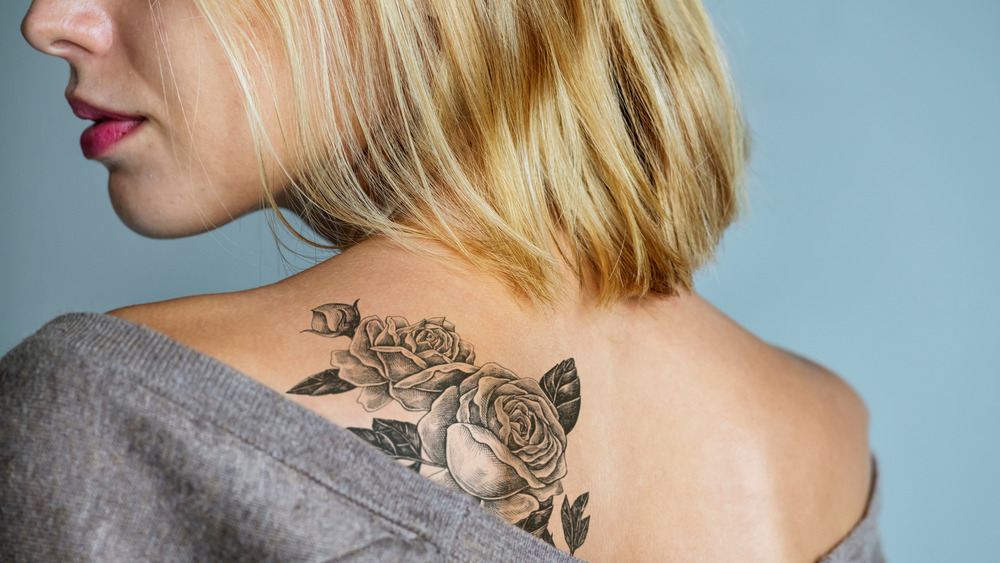Here's Why Your Tattoos Are Getting Itchy (& How To Stop It)
Irritation around a tattoo can be scary. If you've put in the effort to find a great artist and followed all of their aftercare instructions, noticing that your new body art is raised and prickly can be alarming.
Whether your ink is fresh or decades old, there are a number of reasons why your tattoos may feel tickly. And not all of those reasons are cause for concern. New York City board-certified dermatologist Shari Marchbein told Allure, "When the skin heals [from a tattoo] and scars, a particular inflammatory cell called a mast cell becomes more prominent in this area of the skin, and these cells can release histamine, the same substance which causes allergies, hives, and subsequent itchiness. This helps to explain why scars and areas of skin injury, in general, become itchy."
Depending on the size and style of your tattoo, Healthline explains that the healing process can take up to six months. If you notice itching in this period it may just be your body working to prevent infection and repairing itself. However, if the itching persists or appears periodically throughout the year, here are some of the why your tattoo feels like it's crawling off your skin and the things you can do to stop it.
Some of the reasons why you feel the need to scratch at your tattoo
Dramatic changes in the weather can have a really big impact on your body, and yes, that goes for tattoos, too. For starters, as the American Academy of Dermatology Association website notes, the sun can wreak havoc on your tattoos. And as Byrdie points out, a rise in temperature and humidity can cause your piece of body art to swell, which "causes a slight stretching of the skin, which also results in an itch." On the flip side, Byrdie explains that the colder months can dry your skin out, which can also lead to irritated tats.
As external changes can make your tattoos feel uncomfortable, internal bodily changes may irritate them too. As Skin Artists writes, "A rise in blood pressure, increased adrenaline, a change in body temperature—all of these things can affect your tattoo." If you've been in a stressful situation or are feeling anxious for a long period of time, you may just have the culprit.
And if you've been diagnosed with any preexisting skin conditions, such as eczema or psoriasis, WebMD notes that a "tattoo can cause flare-ups of your condition, including bumps, itching, and rash." If you have a skin condition, the outlet suggests consulting your dermatologist before sitting down in the tattoo artist's chair.
When an itchy tattoo is more serious
Getting tattooed is quite a traumatic process for the skin, as it exposes deeper layers. While it's totally common to experience minor skin irritation around where you got your tattoo, Healthline points out that any bumps and redness should subside after a couple days. If the rash don't go away, you should speak to your tattoo artist or your doctor. The outlet also notes that if you're experiencing hives, fever, or swelling, there's a chance your tat isn't healing correctly and may be infected.
Another reason that your tattoo could be raised and itchy? You could be allergic to the ink. The American Academy of Dermatology Association website points out that some people can experience allergic reactions periodically years after their tattoos have healed, and the color of the ink may have something to do with it. "Red is often the culprit, but any color can cause an allergic reaction," the AADA writes. That said, Skin Artists maintains that while these reactions "do happen sometimes," this is "probably the least likely" reason for an itchy piece of body art.
How to stop your tattoo from itching
If your tattoo is new and you're experiencing itching? Continue to follow the aftercare instructions given to you by your artist and make sure your tat is clean. If your tattoo is older, Healthline says that you should consider using over the counter ointments to try to calm it down.
The outlet also notes that hydrocortisone creams may also take care of an itchy older tattoo. Another option for when you've got a piece of ink that you can't stop scratching at? Healthline recommends "an oatmeal-based lotion or a thicker moisturizer made from cocoa butter." There's also the tried-and-true move of putting a cool compress on the itchy tat to soothe the irritation. However, as Healthline advises, "Ask your doctor before using any compresses around recent tattoos."
Again, if it goes beyond basic itchiness, cool compresses and creams may not do the trick. As the American Academy of Dermatology Association website writes, "If you have any signs or symptoms of an infection, see your doctor or a board-certified dermatologist right away." Your epidermis will almost certainly thank you.



